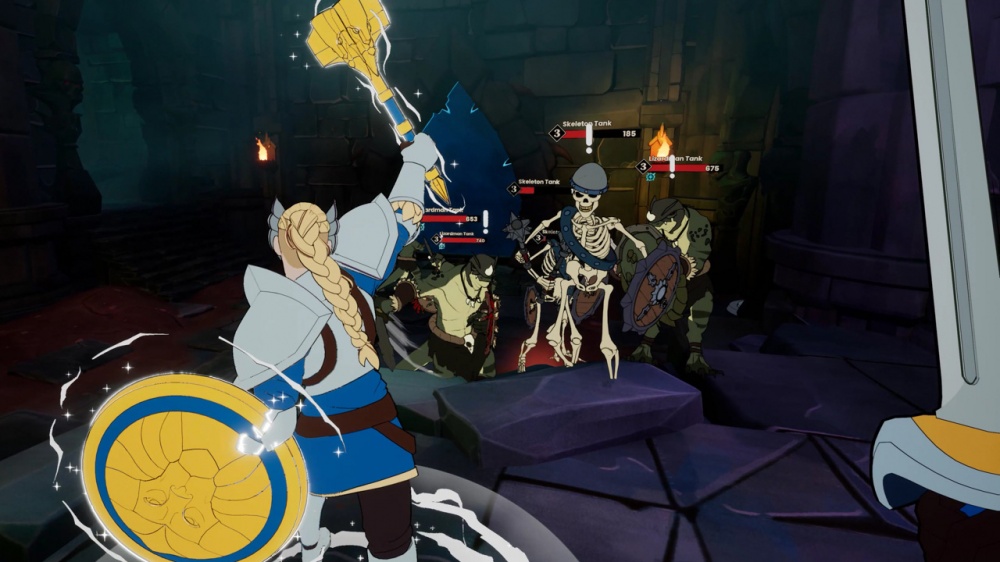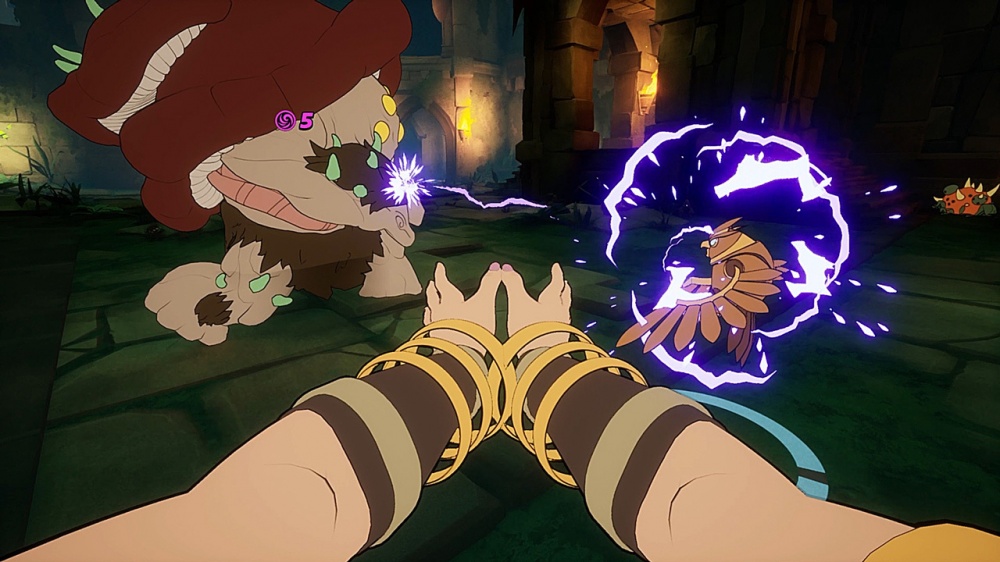System: Switch
Release date: September 12, 2023
Developer: Beamdog
Publisher: Aspyr
Booting up MythForce on Switch, and the first thing you’re met with is an uncomfortably long loading screen. After that, you’re treated to an animated intro that aims to mimic Saturday morning cartoons of the 80s – think “Thundercats” and “He-Man, Masters of the Universe”. It’s cute enough to induce a smile the first time around, but if you look past the nearly 40-year old stylistic veneer and the cheesy theme tune, you’re left with a game that sadly doesn’t know what to do with itself. It’s as though developer Beamdog started with the concept of a cartoon co-op rogue-lite, and then carried it through to its most saccharine, predictable conclusion.
Let’s start with that aesthetic. One cursory glance at MythForce’s art style is likely enough to tell you whether or not you’ll have any interest in checking the game out. It’s an odd pairing – 80’s cartoon and first person rogue-lite. It’s peculiar enough to suggest that there might be some subversive element to the game’s world, characters and lore, but there isn’t. MythForce’s typically diverse cast of milquetoast heroes play it straight, with predictable backstories, middle-of-the-road voice acting, and quippy writing that all feels arbitrary and inconsequential. The world you traverse over the course of the game’s rogue-lite campaign is equally modest and unadorned – it’s a formulaic blend of dungeons, castle grounds, and medieval surroundings. A bit of originality on the part of the developer, whether it be through clever dialogue or an engaging overarching narrative could have really spiced up MythForce’s core concept – alas, here we are.

Moving past the lackluster (albeit surface level) creative direction, MythForce’s foundational gameplay is equal parts serviceable and unremarkable. You have four different heroes to pick from; Victoria, a sword/mace wielding Knight, Maggie, a ranged mage with a focus on healing and protection, Hawkins, an archer that can phase through enemies, and Rico, a dexterity focused rogue with a penchant for daggers. The game’s combat feels strikingly similar to Skyrim’s in that it isn’t entirely weightless, but there isn’t a whole lot of feedback there either. One area where the game’s combat really falters is its audio design. With up to four players chipping away at hordes of skeletons, goblins, mushrooms (???) and phantom pots, the lack of discernible audio cues makes it difficult to map out the playfield in your head on a moment to moment basis. This would be easier to do visually in a third-person game (think Dark Souls), but in a first person title like MythForce, your field of view is limited to what’s directly in front of you. Far too often I found myself being jumped from behind by a phantom set of enemies that in reality, my character should have been able to at least hear.
The make or break element of any rogue-lite is in how it manages its progression, be it within each individual run, and/or across multiple different excursions. MythForce, again, isn’t very interesting in this regard either. As you progress through each stage, you’ll enter a procedurally generated room that will cordon itself off from the wider level so that you can kill a predetermined amount of baddies. Once said meanies have been dispatched, you’re free to pick up a perk at the room’s exit, and loot four chests that are dotted around the environment. Looting chests nets you gold which can be spent during each run to equip trinkets that augment your abilities, or you can keep the cash in your back pocket – it will remain there if and when you manage to complete the stage. The perks you obtain during each run aren’t hugely game-changing – it’s a damage buff here, and an increase to your movement speed there. The permanent upgrades you can apply in the game’s menu-hub are a little more substantial – however the sheer amount of grinding you have to partake in to acquire any of them is hugely off-putting. I was able to secure a fairly minor (and permanent) damage increase for one of my heroes after about four 20 minute runs, which isn’t great.

Speaking of that menu system, it’s definitely worth drawing attention to the general lack of polish and cohesion that MythForce suffers from. The flashy cutscene that opens the game gives way to one of the worst UI/UX experiences I’ve had in a modern video game. Navigating the menus and determining the relevance of each onscreen option and upgrade is an arduous slog – not enough work has been done here to make you want to interact with the game, which is probably one of the harshest criticisms I’ve ever attributed to a title. In-game, things aren’t much better. MythForce’s attempt at a “tutorial” is nothing more than a front-loaded wall of text, with arrows pointing to various onscreen elements – it’s incomprehensible and incredibly unfriendly to new players. On Switch, the game also suffers from some notable technical shortcomings. Visually, it’s easy to get the impression that MythForce was intended for more powerful platforms than the Switch – the resolution is low, and the environments in particular look soupy and unrefined. The game’s frame rate routinely fails to pin itself to 30 FPS – killing an enemy, spawning an enemy, or having a co-op partner join you online tanks the performance and severely limits your ability to fight enemies, which is the whole point of MythForce.
The Verdict

It’s a shame to have to be so down on a game that I was genuinely quite excited to check out. I feel as though if even one core element of MythForce’s design felt uniquely original, it would have elevated the entire experience in kind. Instead, the game is mired in predictable mediocrity. The 80’s cartoon aesthetic may have been sufficiently quirky ten years ago, but it can’t propel a game on its own in 2023. Perhaps with future game updates MythForce can carve out an identity for itself that goes beyond “hey look, nostalgia!” – in the meantime however, this particular cartoon won’t be getting a re-run any time soon.
MythForce copy provided by the publisher for the purposes of this review.